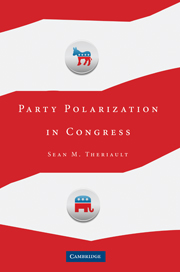Book contents
- Frontmatter
- Contents
- Acknowledgments
- 1 Party Polarization in the U.S. Congress
- PART I BUILDING BLOCKS FOR EXPLAINING PARTY POLARIZATION
- PART II CONSTITUENCY CHANGE
- PART III INSTITUTIONAL CHANGE
- 7 Connecting Constituency Change to Institutional Change
- 8 The Interaction in the Legislative Process
- 9 The Link between the House and the Senate
- 10 Procedural Polarization in the U.S. Congress
- Bibliography
- Index
10 - Procedural Polarization in the U.S. Congress
Published online by Cambridge University Press: 05 September 2012
- Frontmatter
- Contents
- Acknowledgments
- 1 Party Polarization in the U.S. Congress
- PART I BUILDING BLOCKS FOR EXPLAINING PARTY POLARIZATION
- PART II CONSTITUENCY CHANGE
- PART III INSTITUTIONAL CHANGE
- 7 Connecting Constituency Change to Institutional Change
- 8 The Interaction in the Legislative Process
- 9 The Link between the House and the Senate
- 10 Procedural Polarization in the U.S. Congress
- Bibliography
- Index
Summary
On July 18, 2003, Chairman Bill Thomas substituted a bipartisan pension overhaul bill with a Republican-concocted plan less than 12 hours before the Ways and Means Committee mark-up. The Democrats, an already frustrated minority, vigorously retaliated. To stall committee action, all but one of the Democrats on the committee barricaded themselves in the committee library. Although Thomas called for the Capitol Police and the Sergeant at Arms to evict the Democrats, neither chose to get involved in the highly charged partisan fight. Representative Pete Stark, the only committee Democrat not in the library, continuously objected to Thomas's unanimous consent to dispense with the bill's reading. On one particular attempt, Thomas banged down the gavel before Stark could object. When Stark criticized Thomas's move, Representative Scott McInnis told him to “shut up.” Stark retorted, “You think you are big enough to make me, you little wimp? Come on, come over here and make me, I dare you…You little fruitcake. You little fruitcake. I said you are a fruitcake.” Overtly partisan games quickly deteriorated into playground taunts. After Democrats and the political pundits used the weekend political shows to ridicule him, Thomas offered a tearful apology on the House floor for his heavy-handed tactics.
Although a news story for less than a week, this event has come to typify the relationship between Democrats and Republicans on Capitol Hill. The majority party has a substantive goal (business-friendly reforms for the pension system).
- Type
- Chapter
- Information
- Party Polarization in Congress , pp. 218 - 228Publisher: Cambridge University PressPrint publication year: 2008



